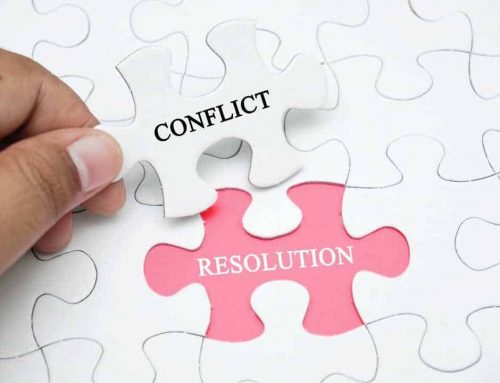The working environment is not always easy to navigate. When priorities, visions or personalities compete or collide, sparks can fly. Often, disputes can be resolved without outside assistance, but what happens when business partners or associates can’t agree on important issues such as finances, company direction or contracts? Or what if two parties just don’t see eye-to-eye?
When passions run high, it’s tempting to dive straight into legal proceedings. However, business mediation can resolve issues before they get that far. If you think you need help to resolve a dispute, here’s everything you need to know about business mediation…
What Is Business Mediation?
Business mediation is a way to resolve disputes with the help of an impartial third party. It is used when internal/informal discussions have failed, but both sides are willing to work together towards a mutual solution rather than go through costly legal proceedings.
An independent mediator leads the parties through constructive discussion and problem solving. The aim is to explore issues in a neutral, co-operative environment and ultimately reach an agreement that satisfies all parties.
It’s a voluntary process, so if an agreement cannot be reached both parties can walk away without affecting their legal positions.
Business mediation can be used to settle disputes between parties within the same company or between businesses, such as in business and client relationships.
How Does Business Mediation Work?
Mediation for businesses is much the same as any other kind of mediation. The parties in dispute meet in a neutral setting with an impartial mediator. The parties have control over selecting the mediator and where it takes place. There is no set process, but a general outline looks like this:
- Usually, the mediator will open the dialogue by introducing themselves and both parties and laying out the process the mediation will follow.
- The parties are invited to give an opening statement. Both sides then have the chance to give their version of events and the mediator may ask clarifying questions.
- An open discussion follows, where the mediator may ask more questions for clarification or to provide greater understanding for the other party. They will establish the facts, a timeline of events, and possible options for moving forward.
- The mediator may then ask the parties to caucus (get together with the mediator separately, without the other party). Here, they propose solutions and try out scenarios; pushing forwards towards a settlement.
- There may be some back and forth as the mediator tries to clear up misunderstandings and outline points of agreement. They may put forward proposals and urge both sides to accept a final agreement.
In this way, both parties are active participants creating their own agreements, conditions and settlements.
Why Should I Use Mediation?
Usually, it is in the best interests of the business and the parties to reach an agreement rather than end up in court. In litigation there’s one winner and one loser; in mediation, both parties should feel they have won in some respect. While litigation is hostile, mediation is about cooperation. Litigation is adversarial, mediation is collaborative.
Courts can take a harsh view of parties who have refused to even try resolving issues via mediation and have headed straight to legal proceedings. In addition, solutions can be agreed on in mediation that might not be available at court, such as non-monetary agreements, credit notes etc…
By the time disagreeing parties have gone through litigation, it’s likely their working relationship has completely broken down, and often it cannot be rebuilt. Litigation takes a lot of time, effort and focuses away from what’s really important – running your business. Business mediation avoids all of that and can provide a more satisfying process and outcome for both sides.
The Advantages Of Business Mediation Vs Litigation:
- Both parties have control over the process and outcome. Parties choose the mediator, setting and agree the terms of resolution.
- Mediation can allow business relationships to remain intact – whereas they are hard to rebuild after litigation.
- It is more efficient than drawn out legal proceedings.
- Mediation costs significantly less
- It is confidential. If you would rather the inner workings of your business and the particulars of the dispute remain confidential, mediation is the more discreet option. The parties are asked to sign confidentiality agreements and what is said does not end up a matter of public record as it does in litigation.
- The result is still legally binding provided there is a signed settlement.
How Much Does Business Mediation Cost?
It would be nice if mediation was free, but alas, like most things in business it requires some investment. However, if your dispute simply cannot be resolved internally, business mediation is definitely the most cost effective way of sorting it out.
Mediation is substantially cheaper than the cost of solicitors and legal hearings. You’re looking at a couple of hundred pounds a session, as opposed to thousands of pounds wrangling in court.
You’ve worked hard building your business and your money is better invested in your growth and success than wasted on dispute resolution.
How To Find A Mediator For Business Disputes
To find a business mediator that will suit your purpose, there’s a couple of things to think about. Firstly, what style of mediation is going to suit you and your communication style? Would you like someone who will offer up ideas and guide you towards an agreement? Or would you prefer someone who will step in when needed, but largely lets the two parties define their own terms of agreement?
You will of course have to think about budget, time and location and these could be the dominant factors in your decision. Ask about the mediator’s experience and training. Have they had any significant successes with similar disputes? What is their ‘style’ and process? Do you feel comfortable with their approach?
Disputes at work are upsetting for all involved and the emotions they bring to the surface can make finding a resolution difficult. Parties may not want to face each other, or talk to each other at all. Sometimes, relationships have broken down to the point where litigation is the only option. But for most, mediation is a cheaper and more efficient way to find a satisfying solution. Both parties feel their voices are heard and they decide the way forward together, rather than leaving it to a court to decide who wins or loses.
If you have a business dispute that you think mediation could help with, speak to our dispute resolution team…




